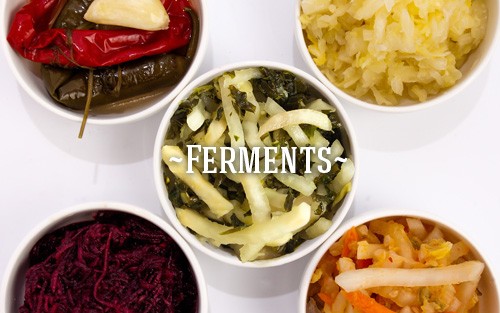
06 Jul 2016
The Importance of Fermented Foods
You’ve heard me bang on time and time again about the importance of maintaining a healthy bacteria population in your gut, and how this aids in the process of digestion. This is why we fork out a fortune on expensive probiotic supplements … but there is a cheaper and incredibly simple way you can also increase the healthy flora in your system, and that is by introducing fermented foods into your diet!
What is Fermentation?
Fermentation is a metabolic process in which microorganisms such as bacteria (like the lactobacillus you hear health professionals go on about), yeast or fungi convert organic compounds – usually carbohydrates such as starch and sugar – into alcohol or acids. For example, lactobacilli bacteria turn sugars and starch into lactic acid, and acetobacter bacteria turns alcohol into acetic acid (commonly known as vinegar).
So what does the process of fermentation actually do?
- It preserves food (this is why tempeh has a much longer expiry date than say, fresh tofu, or why pickled vegetables can be stored for months, sometimes years, while fresh ones last a few days at best)
- Changes the taste of food – often making it more sour or tangy (yummy!)
- Decreases foods’ cooking time
But most of interest to us FODMAPers ….
- Increases the “good” bacteria population in your gut (!!!!)
- Some bacteria can increase levels of vitamins (especially things B Vitamins) in foods
- Fermentation can destroy “anti-nutrients”, that is, natural or synthetic compounds that can sometimes interfere with nutrient absorption (e.g., Phytic Acid found in legumes and seeds which binds minerals such as Zinc and Iron and reduces their absorption)
- Best of all: eating fermented foods with certain food products can make the food you are eating more digestible e.g., many microbes produce enzymes that break down cellulose (found in plant foods & which we can’t digest normally) into sugars, which we can (win!)
Some FODMAP Friendly Fermented Foods to include in your diet include:
- Pickled Vegetables – things like pickled cucumber, some kimchi & saukraut (depending on which cabbage it is made from) use lactobacilli bacteria that converts the sugars in the vegetables to lactic acid
- Sourdough bread (not Gluten-free) – the yeast in bread ferments the flours in the sugar to form carbon dioxide & alcohol
- Kombucha Tea (weak): make your own & make the tea black as store brought Kombucha is made on strong black tea which is not FODMAP-friendly – the black tea is fermented with yeast & bacteria, and is served cold
- Vegan Yoghurt – I use Luz Almond almond yoghurt or make my own Coconut Yoghurt (the simple recipe can be found in the FODMAP Friendly eBook) – contains gut-friendly Lactobacilli bacteria
- Miso, Tempeh & Tamari Sauce – all forms of fermented soy bean – while Tempeh and Miso have been given the green light, Tamari is yet to be tested but I find is well tolerated in most with FODMAP intolerances in small quantities (all you really need)
- Kefir – you can make your own water Kefir and there are quite a few good recipes online – just be weary if trying it out for the first time as it can be tricky
- Vanilla: when curing in the sun or in heat, vanilla pods undergo fermentation where the microbes convert to a sugar
My favourite Fermented Foods Company: Lewis & Son
The Lewis & Son Ferments range are all raw, unpasteurised products. This means that all beneficial enzymes, viable micro-organisms and minerals are present. They are a Melbourne based company and have been around since 1945 (wowie!) Some of their products were actually the first in the world to be certified FODMAP Friendly! They also have a big Vegan Range (don’t be put off by the fact they’re also a Deli) and the guys who run the show are so lovely and down to earth, you just want to support them as much as possible. Here are a few of my FODMAP-friendly Vegan products in their range:
- Gajar Ka Achaar (pickled carrots)
- Kale Kraut
- Preserved Lemons
- Rockin’ Out Brocco-Kraut (my favourite by far! Has turmeric though so I’m probably a bit biased 😉
- Kalimata Olives (the best I’ve ever tried … given the “Shaz is Latin and snobby when it comes to Olives” stamp of approval)
- Roasted Capsicum / Peppers
So there you have it … a quick rundown on ferment foods and why they’re important to include in your FODMAP-friendly Vegan diet. You’ve got a range of options to choose from … just goes to prove that being a FODMAP Friendly Vegan doesn’t have to = restrictive eating 😉
